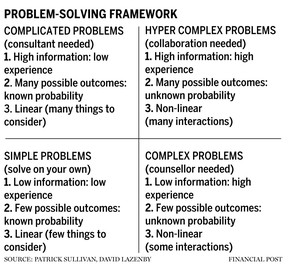How does John decide whether to sell or lease his grain farm before he retires next spring?

How does John decide whether to sell or lease his grain farm before he retires next spring?

Article content
Q. I farm in Saskatchewan and own 3,100 acres of grain land. I’m planning to retire this spring. Do I sell the land or lease to a neighbor? How will the trade war affect the value of property in the short term or a year from now? If I sell, what will the money in the bank be worth in a year or two? What is the right decision: sell or lease? And how do I decide? —John in Saskatchewan
THIS CONTENT IS RESERVED FOR SUBSCRIBERS ONLY
Subscribe now to read the latest news in your city and across Canada.
- Exclusive articles from Barbara Shecter, Joe O'Connor, Gabriel Friedman, and others.
- Daily content from Financial Times, the world's leading global business publication.
- Unlimited online access to read articles from Financial Post, National Post and 15 news sites across Canada with one account.
- National Post ePaper, an electronic replica of the print edition to view on any device, share and comment on.
- Daily puzzles, including the New York Times Crossword.
SUBSCRIBE TO UNLOCK MORE ARTICLES
Subscribe now to read the latest news in your city and across Canada.
- Exclusive articles from Barbara Shecter, Joe O'Connor, Gabriel Friedman and others.
- Daily content from Financial Times, the world's leading global business publication.
- Unlimited online access to read articles from Financial Post, National Post and 15 news sites across Canada with one account.
- National Post ePaper, an electronic replica of the print edition to view on any device, share and comment on.
- Daily puzzles, including the New York Times Crossword.
REGISTER / SIGN IN TO UNLOCK MORE ARTICLES
Create an account or sign in to continue with your reading experience.
- Access articles from across Canada with one account.
- Share your thoughts and join the conversation in the comments.
- Enjoy additional articles per month.
- Get email updates from your favourite authors.
THIS ARTICLE IS FREE TO READ REGISTER TO UNLOCK.
Create an account or sign in to continue with your reading experience.
- Access articles from across Canada with one account
- Share your thoughts and join the conversation in the comments
- Enjoy additional articles per month
- Get email updates from your favourite authors
Sign In or Create an Account
or
Article content
Article content
FP Answers: I’m afraid many of your questions, John, are for specialists of a different kind. For instance, you need an economist’s prediction to know what might happen with tariffs and how the value of money may be affected. I can, however, answer your question: “How do I decide?”
Article content
Article content
By signing up you consent to receive the above newsletter from Postmedia Network Inc.
Article content
To know if you should be leasing or selling your farm, talk to a collaborative professional who will guide you through a process so that you can confidently make the decision of leasing or selling.
Article content
Why work with a collaborative professional? Because the professional will share their knowledge and at the same time you will gain valuable experience. Combining knowledge with experience gives you the power to confidently solve tough problems such as the one you are facing, and new learning opens new possibilities, both financial and lifestyle.
Article content
You will know when you are collaborating with a professional when you are using a shared workspace, such as computer simulation, and both of you are contributing to solve your problem. Computer simulation allows you to compress time to quickly learn and gain experience within a safe place, when gaining real world experience isn’t practical.
Article content
Article content
John, my thoughts on this problem-solving approach comes from Patrick Sullivan and David Lazenby’s 2005 book, Scenario Selling. Their ideas transformed the way I deliver financial planning and I believe if I give you a summary of their thoughts on solving problems you, too, will see the value in the collaborative approach.
Article content
Article content
They classify problems using these dimensions and then place them into a quad box which I have put together in an accompanying chart:
Article content
- Information versus. Experience;
- Certainty versus risk;
- Linear vs. Non-linear.
Article content

Article content
Simple problems are the “no brainers” you face every day which you don’t need help solving.
Article content
Complicated problems don’t require a lot of experience but require knowledge and information. The thought process is linear in nature: Solve A, then B, then C, etc. to get to your answer. A complicated question may be, “Which equities to purchase?” You could hire a knowledgeable consultant to do the research for you or you could take the time to acquire the knowledge yourself and become a do-it-yourself investor.
Article content
Complex problems don’t require a lot of information but they require experience. Think back to when you learned to ride a bicycle. You learned from experience, not book knowledge, and you probably had a parent or counsellor providing feedback and holding the bicycle.




